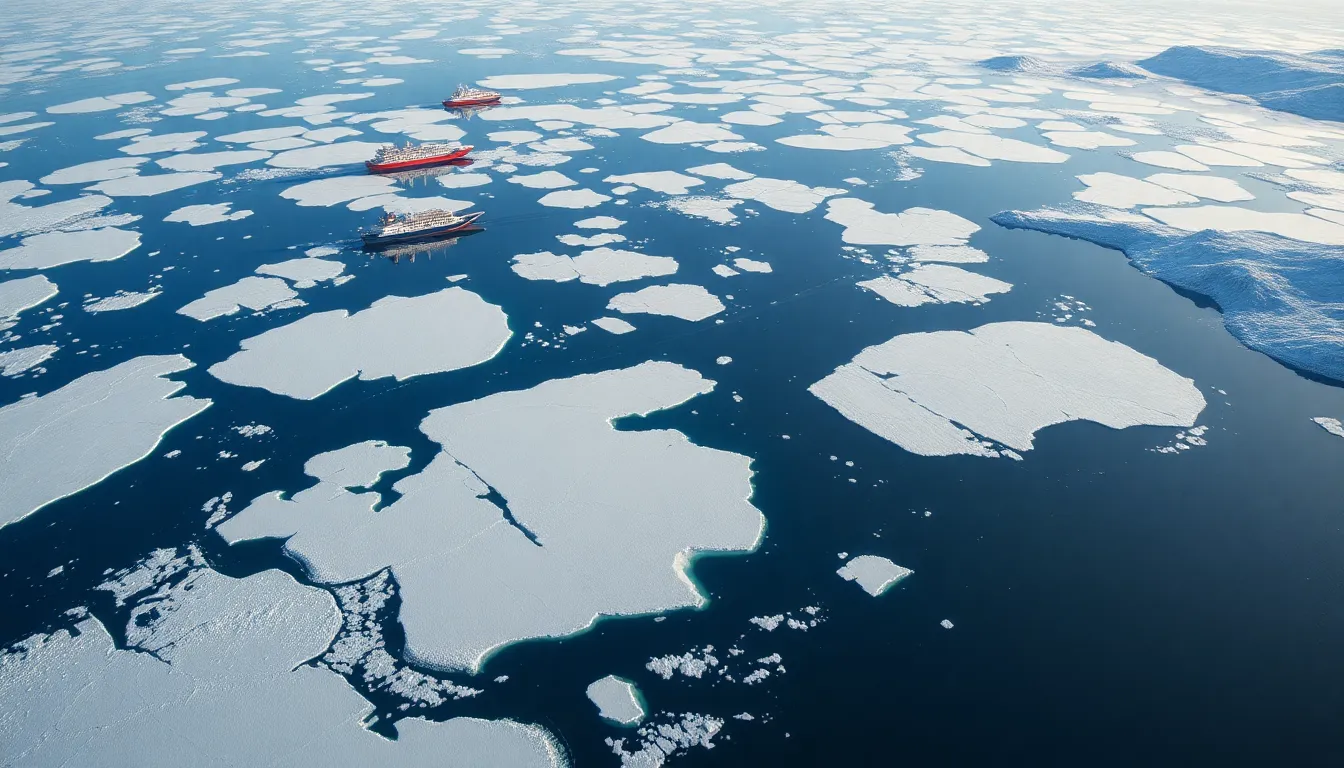In recent years, the Arctic has emerged as a focal point of geopolitical interest, drawing attention from global powers like China and Russia. As climate change opens up new shipping routes and access to untapped resources, both nations have intensified their collaboration in this frigid frontier. This partnership not only enhances their strategic positions but also reshapes the dynamics of Arctic governance.
China’s growing ambitions in the Arctic, paired with Russia’s established presence, create a unique synergy. Together, they explore opportunities in energy, trade, and scientific research, aiming to bolster their influence in this vital region. Understanding their collaboration sheds light on the future of Arctic policy and international relations, highlighting the implications for other nations and the environment.
Table of Contents
ToggleOverview of China Arctic Activity Collaboration with Russia
China and Russia’s collaboration in the Arctic represents a strategic partnership aimed at leveraging the region’s potential. This cooperation stems from shared interests in trade, energy, and scientific exploration.
Key Areas of Collaboration
- Energy Development: China invests heavily in Russian energy projects, particularly in oil and natural gas. The Power of Siberia pipeline, operational since December 2019, symbolizes this collaboration, ensuring China’s access to energy resources.
- Shipping Routes: The Northern Sea Route (NSR) offers a faster maritime path, and both nations aim to enhance its usage. China seeks to reduce shipping times between Asia and Europe, while Russia benefits from increased shipping traffic and revenue.
- Scientific Research: Joint research initiatives focus on climate change, biodiversity, and resource management. Collaborative projects include Arctic scientific expeditions, promoting knowledge-sharing and technological advancements.
Geopolitical Implications
China’s increasing presence in the Arctic can alter traditional geopolitical dynamics. Russian support provides China the necessary foothold to influence Arctic governance. This partnership may challenge Western dominance in the region and could reshape international policy frameworks.
Future Prospects
Upcoming projects, especially in infrastructure and technology, emphasize the long-term vision both countries share for Arctic development. As initiatives progress, the collaboration between China and Russia is expected to expand, solidifying their roles as key players in the Arctic landscape.
Historical Context

China and Russia share a complex and evolving history regarding Arctic collaboration. Their interactions have evolved from initial engagements to more defined cooperative efforts amid changing geopolitical landscapes.
Early Engagements
China’s interests in the Arctic emerged in the early 2000s, marked by its status as an observer in the Arctic Council in 2013. Russia initiated Arctic development through its Arctic Strategy, prioritizing resource extraction and military presence from 2008. Early bilateral discussions centered on exploring shipping routes and energy projects, setting the groundwork for deeper collaboration. The 2014 signing of an agreement on comprehensive cooperation underscored their mutual interest in Arctic development.
Recent Developments
Recent years witnessed intensified cooperation between China and Russia in the Arctic. The 2019 Arctic Strategy adopted by China emphasizes securing energy sources and creating a “Polar Silk Road.” Simultaneously, Russia’s increased military and economic activities in the Arctic bolster its central role in the region. The Power of Siberia pipeline, which became operational in December 2019, represents a significant energy partnership, facilitating natural gas exports from Russia to China. Joint scientific research initiatives, such as the Sino-Russian research vessel “Yuan Wang,” focus on climate change and resource management. These developments reflect a strategic alignment that aims to challenge Western influence and redefine Arctic governance.
Strategic Importance of the Arctic
The Arctic holds significant strategic importance due to its vast natural resources, emerging shipping routes, and geopolitical dynamics. The collaboration between China and Russia in this region underscores their shared interests amidst global competition.
Economic Opportunities
Economic opportunities in the Arctic are abundant, primarily driven by natural resources and trade routes. The Arctic region is rich in oil, gas, and minerals, with estimated reserves exceeding 90 billion barrels of oil and 1,670 trillion cubic feet of natural gas. China invests in Russian energy projects, such as the Power of Siberia pipeline, essential for enhancing energy security. Both nations aim to capitalize on the Northern Sea Route, expected to reduce shipping times by 40% compared to traditional routes. This collaboration leads to increased investments in infrastructure and technology, driving economic growth and enhancing trade efficiency between Asia, Europe, and North America.
Geopolitical Implications
Geopolitical implications of China and Russia’s Arctic collaboration significantly affect global balance. As China expands its Arctic presence, supported by Russia, it challenges traditional Western dominance in the region. Their partnership influences Arctic governance, shifting authority towards non-Western powers and prompting a reevaluation of international policies. Military cooperation, such as joint naval exercises, increases their strategic foothold, enhancing security along vital shipping lanes. This evolving landscape may lead to increased tensions with NATO countries, particularly the United States and Canada, raising questions about Arctic sovereignty and security in the coming years.
Key Collaborative Projects
China and Russia engage in several collaborative projects in the Arctic, emphasizing infrastructure development and scientific research. These initiatives bolster their strategic partnership and enhance their presence in the region.
Infrastructure Development
Infrastructure development stands out as a major focus of collaboration between China and Russia in the Arctic. Both nations invest in the expansion and modernization of transportation routes and facilities. Significant projects include:
- Northern Sea Route (NSR): China aims to utilize the NSR to reduce shipping times between Europe and Asia. Investments in port facilities and logistics systems enhance the effectiveness of this maritime route.
- Power of Siberia Pipeline: China has invested approximately $400 billion into this pipeline, transporting natural gas from Russia to China. This project not only increases energy security for China but also strengthens Russia’s position as an energy supplier.
- Rail and Road Infrastructure: Development of rail and road networks facilitates the transportation of resources and materials. Projects like the “Yamal LNG” terminal demonstrate this collaboration in logistics and energy transport.
Research Initiatives
Joint research initiatives focus on addressing Arctic challenges and fostering innovation. These efforts include:
- Yuan Wang Research Vessel: This vessel facilitates scientific studies on climate change and its impacts on Arctic ecosystems. It aids both nations in understanding environmental shifts and resource management.
- Climate Change Research: Collaborative projects aim to monitor Arctic ice melting and biodiversity changes. Data collected guides policy and strategy development for resource exploitation and environmental protection.
- Joint Scientific Expeditions: China and Russia conduct joint expeditions to assess natural resources and guard against environmental degradation. These initiatives enhance their scientific understanding and support sustainable development in the Arctic region.
Through these infrastructure and research projects, China and Russia strengthen their Arctic collaboration, positioning themselves as significant players in the evolving geopolitical landscape.
Challenges and Concerns
China and Russia’s collaboration in the Arctic presents various challenges and concerns that encompass environmental, political, and security dimensions.
Environmental Impact
Environmental concerns arise from increased industrial activity in the Arctic, where fragile ecosystems face unprecedented pressure. Resource extraction operations, including oil drilling and mining, risk oil spills and habitat destruction. Climate change exacerbates these issues by melting ice caps, which could lead to rising sea levels and altered weather patterns. According to the Arctic Council, the Arctic Ocean is warming at almost twice the global average, raising alarms about biodiversity loss and methane release from thawing permafrost. Ongoing industrial projects necessitate strict environmental regulations to mitigate these risks.
Political Tensions
Political tensions escalate as China’s Arctic ambitions challenge established powers, particularly the United States and Canada. The strengthening of Russia’s military presence in the region increases competition over territorial claims and control of shipping routes. NATO countries express concerns about security implications, particularly regarding joint military exercises between China and Russia. Diplomatic relations across Arctic nations face strain due to differing interests in resource management, governance, and climate policy. The Arctic Council’s effectiveness could diminish if these tensions lead to polarized stances among member states.
Future Prospects
Future collaboration between China and Russia in the Arctic appears set to intensify. Strategic investments in infrastructure and technology will likely enhance their cooperative efforts, fundamentally reshaping Arctic governance and international relations.
Key development areas include:
- Energy Projects: Both nations aim to expand joint energy initiatives, focusing on oil and gas extraction. Continued investment in pipelines, like Power of Siberia, will drive regional economic growth.
- Shipping Routes: Expansion of the Northern Sea Route remains a crucial focus. Enhancements in navigational capabilities and related infrastructure will facilitate quicker maritime transport between Asia and Europe.
- Scientific Research: Collaborative research will aim to tackle climate change and resource management challenges. Joint initiatives exploring sustainable practices will help minimize environmental impacts while optimizing resource extraction.
- Military Cooperation: Increased military activities may emerge as both nations seek to strengthen their presence in the Arctic. Joint naval exercises and enhanced monitoring capabilities can heighten security and assert their territorial claims.
The geopolitical landscape will significantly shift as China and Russia’s collaboration progresses. Both countries are expected to assert their influence in Arctic policy discussions, challenging existing frameworks dominated by Western powers.
Potential challenges arise from this partnership. Increasing industrial activities can threaten fragile ecosystems, raising concerns about environmental stewardship. Ongoing political tensions may motivate Arctic states to re-evaluate their diplomatic stances, particularly in response to growing Chinese ambitions and Russian militarization.
Overall, the future of China-Russia collaboration in the Arctic holds substantial implications for regional stability, environmental management, and global economic dynamics.
China and Russia’s collaboration in the Arctic represents a significant shift in global power dynamics. As these nations deepen their partnership through joint energy projects and infrastructure development, they position themselves to challenge traditional Western dominance in the region. The implications of their cooperation extend beyond economic interests, influencing Arctic governance and international relations.
While opportunities for growth and innovation abound, potential environmental risks and geopolitical tensions remain pressing concerns. The future trajectory of this partnership will likely shape not only the Arctic landscape but also the broader geopolitical landscape, highlighting the need for careful management and strategic foresight. As China and Russia continue to assert their influence, the Arctic’s role in global affairs will undoubtedly become even more critical.



